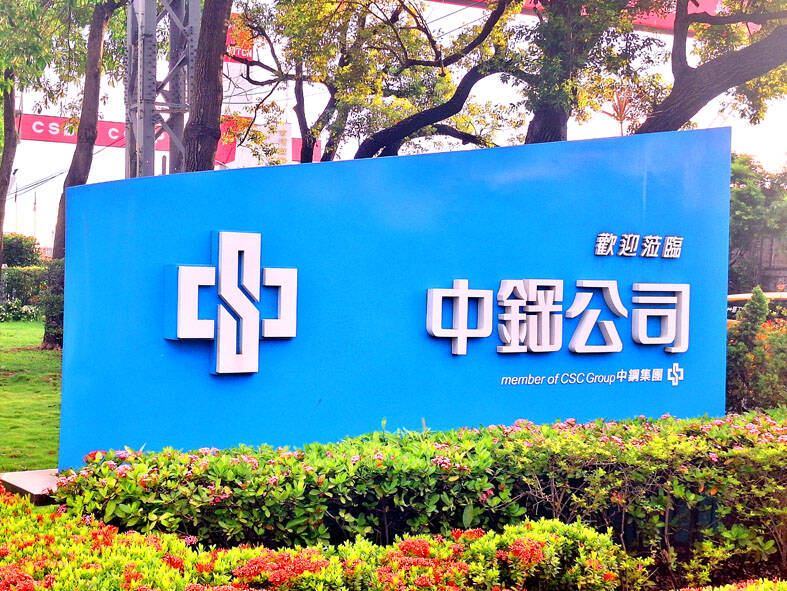China Steel Corp (CSC, 中鋼), the nation’s biggest steelmaker, yesterday raised steel prices by between NT$500 and NT$600 (US$16.67 and US$20) per tonne for domestic deliveries next month to reflect rising raw material costs and to align with global market trends.
Following the adjustments, prices of hot-rolled steel plates and coils, as well as cold-rolled coils would rise by NT$600 per tonne, the company said in a statement.
Other products, such as anti-fingerprint electro-galvanized steel coils for construction, hot-dipped galvanized steel coils for construction and pre-painting, hot-dipped galvanized steel coils for home appliances, computers and other products, and electrical steel coils, are to rise by NT$500 per tonne, it said.

Photo: CNA
The price hikes are milder than its Asian peers, as the company aims to support export-oriented, downstream partners to navigate the challenges from high US tariffs and exchange rate fluctuations, rejecting a proposal by the Ministry of Economic Affairs a day earlier to give special price discounts or concessions to support the local automotive industry, CSC said.
The Kaohsiung-based company’s latest price adjustments came as prices of major raw materials such as iron ore and coking coal climbed to US$100 and US$180 per tonne respectively, it said.
Higher raw material costs also boosted hot-rolled steel prices to about US$950 per tonne in the US and pushed up hot-rolled steel quotes in Europe by US$22 per tonne, while China’s Baoshan Iron & Steel Co (寶鋼) raised prices for its steel plates by 200 yuan to 300 yuan (US$27.88 to US$41.81) per tonne and Vietnam-based Formosa Ha Tinh Steel Corp (台塑河靜鋼鐵興業) hiked its hot-rolled steel by US$11 per tonne, CSC said.

SEMICONDUCTOR SERVICES: A company executive said that Taiwanese firms must think about how to participate in global supply chains and lift their competitiveness Taiwan Semiconductor Manufacturing Co (TSMC, 台積電) yesterday said it expects to launch its first multifunctional service center in Pingtung County in the middle of 2027, in a bid to foster a resilient high-tech facility construction ecosystem. TSMC broached the idea of creating a center two or three years ago when it started building new manufacturing capacity in the US and Japan, the company said. The center, dubbed an “ecosystem park,” would assist local manufacturing facility construction partners to upgrade their capabilities and secure more deals from other global chipmakers such as Intel Corp, Micron Technology Inc and Infineon Technologies AG, TSMC said. It

NO BREAKTHROUGH? More substantial ‘deliverables,’ such as tariff reductions, would likely be saved for a meeting between Trump and Xi later this year, a trade expert said China launched two probes targeting the US semiconductor sector on Saturday ahead of talks between the two nations in Spain this week on trade, national security and the ownership of social media platform TikTok. China’s Ministry of Commerce announced an anti-dumping investigation into certain analog integrated circuits (ICs) imported from the US. The investigation is to target some commodity interface ICs and gate driver ICs, which are commonly made by US companies such as Texas Instruments Inc and ON Semiconductor Corp. The ministry also announced an anti-discrimination probe into US measures against China’s chip sector. US measures such as export curbs and tariffs

The US on Friday penalized two Chinese firms that acquired US chipmaking equipment for China’s top chipmaker, Semiconductor Manufacturing International Corp (SMIC, 中芯國際), including them among 32 entities that were added to the US Department of Commerce’s restricted trade list, a US government posting showed. Twenty-three of the 32 are in China. GMC Semiconductor Technology (Wuxi) Co (吉姆西半導體科技) and Jicun Semiconductor Technology (Shanghai) Co (吉存半導體科技) were placed on the list, formally known as the Entity List, for acquiring equipment for SMIC Northern Integrated Circuit Manufacturing (Beijing) Corp (中芯北方積體電路) and Semiconductor Manufacturing International (Beijing) Corp (中芯北京), the US Federal Register posting said. The

India’s ban of online money-based games could drive addicts to unregulated apps and offshore platforms that pose new financial and social risks, fantasy-sports gaming experts say. Indian Prime Minister Narendra Modi’s government banned real-money online games late last month, citing financial losses and addiction, leading to a shutdown of many apps offering paid fantasy cricket, rummy and poker games. “Many will move to offshore platforms, because of the addictive nature — they will find alternate means to get that dopamine hit,” said Viren Hemrajani, a Mumbai-based fantasy cricket analyst. “It [also] leads to fraud and scams, because everything is now